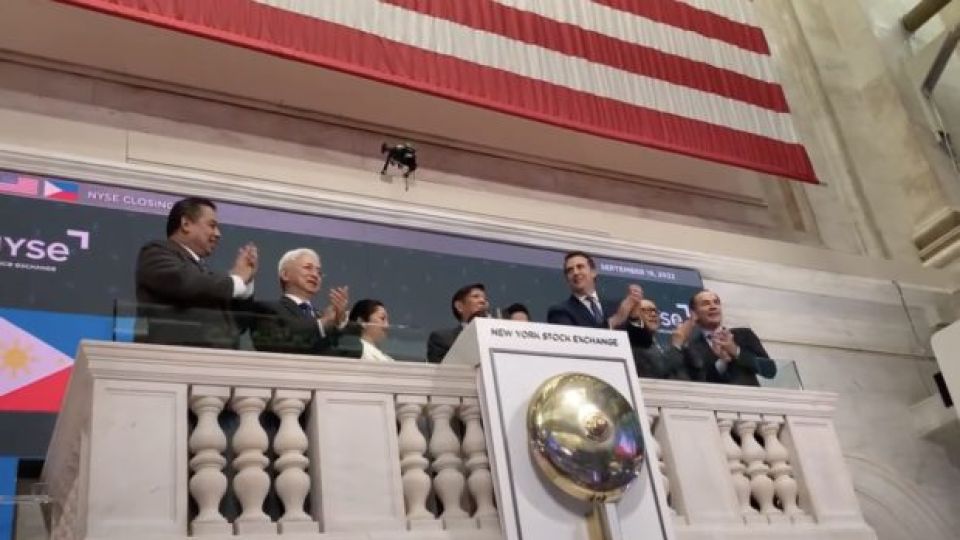September 20, 2022
NEW YORK — President Ferdinand “Bongbong” Marcos Jr. on Monday (Tuesday, Manila time) told foreign investors that the Philippines has adjusted its ways of doing business and increased its scope for mutually beneficial investments.
In his public statement delivered at the New York Stock Exchange, Marcos touted how the Philippines recently enacted policies to further liberalize the economy and welcome more foreign investments.
“We have increased the scope for mutually beneficial investments that would mean more jobs and a better quality of life for Filipinos. For investors, doing business in the Philippines is an opportunity to reap the benefits of a vibrant economy,” he said.
He said the Philippines passed legislation to lower corporate income tax rates and rationalize fiscal incentives.
The government also reduced the minimum paid-up capital requirements for foreign retailers and foreign startups bringing in advanced new technology.
The Philippines also now allows full foreign ownership of companies providing public services, such as telecommunications, shipping, air carriers, railways, subways, airports, and toll roads, Marcos said.
The President also touted the high-quality later that the Philippines offer, a large consumer market, and a wide range of fiscal and non-fiscal incentives.
“At the same time, we remain committed to maintaining sound macroeconomic fundamentals providing a clear development roadmap,” Marcos said.
Aiming for upper-middle-income country status
He said the Philippine economy has returned to its path toward upper-middle-income country status, which he said is achievable within the next few years.
Marcos also said the Philippines has “sound” macroeconomic fundamentals, with the projected growth of its gross domestic product, improved employment situation, accelerated manufacturing activity and double-digit growth of trade.
The government also implemented massive stimulus programs to readily support the most vulnerable sectors, he said.
“Although our borrowings increased substantially during the pandemic, we continue to reduce the cost of our public debt through judicious debt management,” the President said.
The Philippines has also maintained its investment grade credit ratings and is currently gearing up for “A” territory credit ratings in the medium term, Marcos said.
He added that the country has “sufficient” buffers against external shocks, with the steady inflows of overseas Filipino remittances, receipts from business process outsourcing, and foreign direct investment.
Private sector partnership
Meanwhile, protecting Filipino families’ purchasing power is one of the top priorities of his administration, the President said, to be achieved by managing inflation, reducing the scarring effects of the pandemic, and ensuring sound macroeconomic fundamentals.
“Thus, we are implementing policies that enhance food security; transport, reduce energy cost and logistical cost; strengthen social protection; and enhance the quality of education and skills training of our workers,” he said.
The Philippine government is likewise seeking partnerships with the private sector in its development agenda, including public infrastructure, public services, digitization initiatives, energy development, modernizing agriculture, among others, Marcos said.
He said the Philippines is offering investment opportunities to American businesses in areas such as information technology and business process management, medical products and devices, electric vehicles and batteries, agribusiness, and telecommunications infrastructure and services.
“Despite external headwinds, the Philippine economy’s resilience — reinforced by sound policies and decisive leadership — makes us confident about our future,” the President said.
“Over the past few decades, as the Philippines transformed into one of the most promising emerging markets, the United States has been among our steady partners. For that, we are truly grateful. At the same time, American companies doing business in the Philippines have benefited significantly from our economic successes,” he added.
After delivering his remarks, Marcos signed the guest book at the New York Stock Exchange and rang the closing bell, which signifies the closing of the session of the day.
President Ferdinand “Bongbong” Marcos Jr. rings the closing bell of the New York Stock Exchange, signifying the closing of today’s trading session. @inquirerdotnet pic.twitter.com/t9YAEttXoI
— Daphne Galvez (@DYGalvezINQ) September 19, 2022
Monday marks the second day of Marcos’ working visit to New York, United States. On Tuesday, he will be delivering an address at the United Nations 77th General Assembly.
During his departure speech in Manila on Saturday, Marcos said he would bring up “economic recovery, food security, and agricultural productivity” during his speech at the UN high-level debate.


